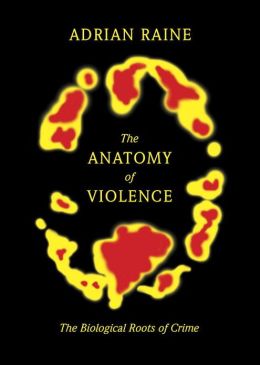Saturday, April 27th, 2013
A couple of months ago, we shared a story about a pilot episode for a CBS television show based on the work of a very intriguing professor who works on issues at the heart of ponerology. That person is Adrian Raine, professor of criminology, psychiatry and psychology at the University of Pennsylvania.
Today’s Wall Street Journal features a sizeable piece by Raine as its “Saturday Essay.”
The title of the essay is “The Criminal Mind” and underneath the title it says “Advances in genetics and neuroscience are revolutionizing our understanding of violent behavior—as well as ideas about how to prevent and punish crime.”
It doesn’t get much more relevant to ponerology than that. And it’s heartening to see Raine given a platform to share his extremely important and provocative ideas in The Wall Street Journal just in advance of the release of his book The Anatomy of Violence: The Biological Roots of Crime.

Raine’s essay touches on: (more…)
Tags: adrian raine, aggression, amygdala, boston marathon bombings, criminology, genetics, legal system, neurocriminology, neuroscience, prefrontal cortex, the anatomy of violence, the wall street journal, tsarnaev brothers, violence
Posted in Books, Crime, Newspapers, Online News, Research | No Comments »
Tuesday, March 5th, 2013
Each year, the American Academy of Forensic Psychology (AAFP) and the American Psychology-Law Society (AP-LS, Division 41 of the American Psychological Association) jointly present the Saleem Shah Early Career Development Award.
Saleem A.Shah, Ph.D. was a highly esteemed psychologist. In fact, he was so influential that some credit him with helping to establish the specialty of forensic psychology.
While working at the National Institute of Mental Health (NIMH), Shah directed, for nearly 20 years, an interdisciplinary research program focused on antisocial and violent behavior. The program was first called the Center for Studies of Crime and Delinquency and later known as the Antisocial and Violent Behavior Branch.
He had a special interest in the relationship between mental health and the law and, in his role at NIMH, helped form the American Academy of Psychiatry and the Law.
Known as a man of strong conscience with deep concern for patients and their rights, he spoke all over the world, urging people to make sure that psychology was used in society in a compassionate and ethical way.
Tragically, Shah died in a car accident in 1992.
The award bearing his name has been presented annually, since 1995, to a young professional who demonstrates “significant early career achievement in forensic psychology or related fields of law.” (more…)
Tags: american academy of forensic psychology, american psychological association, american psychology-law society, criminology, daniel craig, forensic psychology, james bond, legal system, martin sellbom, national institute of mental health, psychiatry, psychopathy, saleem a. shah
Posted in Online News, Research | No Comments »
Tuesday, March 5th, 2013
One of the most challenging and important questions in ponerology is whether conditions associated with reduced empathy and conscience, and thus with increased likelihood of harmful malicious and neglectful activity, are caused by nature (genes, biology, etc.) or nurture (environment, upbringing, etc.)
Most who work in the fields that study aspects of this question take the view that the answer involves some combination of the two.
But this still leaves us with another question. In what proportion do each of these factors contribute in which people?
One remarkable case offers some fascinating insight on the subject.
Dr. James Fallon
James Fallon, Ph.D. is a highly decorated neuroscientist and Professor Emeritus of Anatomy and Neurobiology at University of California, Irvine. Dr. Fallon has several areas of expertise. One is adult stem cells. Another is psychiatry. Specifically, he is interested in the relationships between brain imaging (he has served as Director of UC Irvine’s Human Brain Imaging Center), genetics and various psychiatric conditions, including schizophrenia, depression and addictions.
An Extraordinary Experiment
Aware of his specialties, for many years, Fallon’s colleagues have sent him brain images they wished to have him analyze.
At one point this interchange took the form of an experiment.
Colleagues sent him 70 MRI scans of brains belonging to people ranging from healthy to mentally ill. Included in the batch were scans of brains belonging to killers, including some notorious ones. But Fallon had no idea which scanned brain belonged to whom.
Nonetheless, he was able to identify differences in five of the scans so dramatic that he could recognize them as the markers of psychopathy. And it turned out that he was correct. The five scans on which he zeroed in actually were those from the brains of psychopathic serial killers. (more…)
Tags: abuse, adrian raine, aggression, amygdala, anterior temporal cortex, biology, brain, brain imaging, child abuse, childhood, conflict, conscience, criminal minds, eeg, emotions, empathy, environment, ethics, free will, gender, genetics, horizon, impulsivity, james fallon, killed strangely, killers, legal system, libertarian, limbic system, lizzie borden, love, maoa, mating, mirror neurons, mri, neurobiology, neuroscience, nurturing, orbital cortex, pet scan, phenylketonuria, pku, psychiatry, psychopathy, rebecca cornell, risk taking, screening, serial killers, serotonin, sex-linked, superficial charm, ted, thomas cornell, transgenerational violence, trauma, university of california irvine, violence, warrior gene, x chromosome
Posted in Personal Profiles, Research, Television Shows | 1 Comment »
